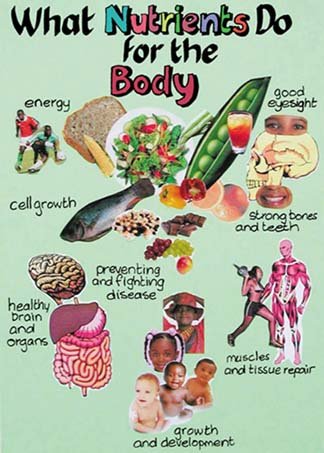Back to: PHYSICAL HEALTH EDUCATION JSS1
Welcome to class!
In today’s class, we will be talking about the functions of food nutrients. Enjoy the class!
Functions of Food Nutrients

Nutrients That Build and Maintain Body Cells
- Proteins
- Mineral elements
- Water
- Fats
- Carbohydrates
Nutrients That Regulate Body Functions
- Water
- Vitamins
- Mineral Elements
- Carbohydrates, including fibre
Nutrients That Provide Energy
- Fats
- Carbohydrates (starches and sugars)
- Proteins
Nutrient and their function
Carbohydrates:
Carbohydrates are the main energy source for the brain. Without carbohydrates, the body could not function properly. Sources include fruits, bread and grains, starchy vegetables and sugars. Make at least half of the grains you consume whole grains. Whole grains and fruit are full of fibre, which reduces the risk of coronary heart disease and helps maintain normal blood glucose levels.
Protein:
Protein is the major structural component of cells and is responsible for the building and repair of body tissues. It is broken down into amino acids, which are building blocks of protein. Nine of the 20 amino acids, known as essential amino acids, must be provided in the diet as they cannot be synthesized in the body. Ten to 35 percent of your daily calories should come from lean protein sources such as low-fat meat, dairy, beans or eggs.
Fat:
Fat is an energy source that when consumed, increases the absorption of fat-soluble vitamins including vitamins A, D, E and K. Twenty to 35 percent of your daily intake should come from fat. Choose healthy options such as omega-3-rich foods like fish, walnuts and vegetable-based oils. Omega-3s help with development and growth. Limit intake of saturated fats such as high-fat meats and full-fat dairy. Other smart choices include nuts, seeds and avocado.
Vitamins:
Vitamin C is necessary for the synthesis of collagen, which provides structure to blood vessels, bone and ligaments. Rich sources include citrus fruits, strawberries and peppers. Folate, found in foods, helps to prevent birth defects. Pregnant women or women who plan to become pregnant should speak with their physician about taking a folic acid supplement, the synthetic form of folate, in addition to their diet. Vitamin D helps to maintain calcium homeostasis. It can be found in food sources or synthesized by the sun.
Minerals:
Sodium helps to maintain fluid volume outside of the cells and helps cells to function normally. Keep intake under 2,400 milligrams per day. Potassium maintains fluid volume inside and outside of cells and prevents the excess rise of blood pressure with increased sodium intake. Rich sources include bananas, potatoes and tomatoes. Calcium helps to maintain and build strong bones and teeth. Include three servings of calcium-rich foods per day including milk, low-fat cheese and yoghurt.
Water:
It helps to maintain homeostasis in the body and transports nutrients to cells. Water also assists in removing waste products from the body. All beverages and high-moisture foods such as soup and watermelon contain water and count towards your daily water requirement. Adults should consume 25 to 35 millilitres of fluids per kilogram body weight or 2 to 3 litres per day.
We hope you enjoyed the class.
Should you have any further question, feel free to ask in the comment section below and trust us to respond as soon as possible.
